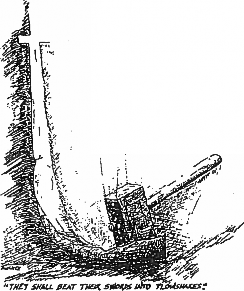
Philadelphia Chapter of Pax Christi U.S.A.

![]()
I . -- - ···----- ·-·· ...-··- .
g&- :-.
··-...
JULY/AUGUST 1998·
![]()
----. ·-
Since our last newsletter -which focused on the nuclear weapons issue -both India and Pakistan have conducted nuclear weapons tests.
The hypocrisy of our own country deploring these actions and calling for an immediate halt to further testing is all too obvious. What moral authority have we to speak? - we who possess such an immense nuclear arsenal, and are committed to keeping it permanently. Though we are bound by treaty obligations to total nuclear disarmament, our government has studiously ignored that obligation for decades and appears determined to continue doing so indefinitely. (A footnote: during the period 1945-1992, the U.S. conducted 1030 tests, an average of one every 17 days for 48 years).

These new tests are a jarring reminder that the nuclear issue, though hidden, remains very much alive and is certain to grow more menacing until it is resolved.
We are also reminded that the
\. issue directly affects all of us and allfuture
) generations. We are not mere spectators,
but vital participants whose engagement (or lack of it) in the issue will largely determine its outcome.
What can be done? The essential starting point is to recognize that possession of this capacity for violence on a colossal scale is a moral issue of the highest order. It begs for a response especially from people who claim to be followers of Jesus, the universally recognized model of nonviolence. That is what prompted the U.S. Catholic Bishops' 1983 Pastoral Letter on Peace.
The United States has always claimed that it possesses nuclear weapons only as a deterrent, i.e., to discourage other nations from actually using nuclear arms. In their Pastoral Letter, the Bishops challenged the morality of that position but they grudgingly gave it temporary and "strictly conditioned" acceptability- not permanently, but only as an interim expedient to enable nuclear disarmament to proceed in a deliberate, orderly manner. (Given the context of the time -at the peak of the nuclear arms race -there was reluctance to insist immediately on more, which, it was feared,
) might destabilize that extremely dangerous situation.) Recently, to mark the 15thanniversary of the Pastoral,
seventy five Bishops issued a document which :flatly condemns
continued possession of nuclear weapons, and describes the policy of deterrence as no longer having any·moral legitimacy (if it ever did). They assert that our government clearly has no intention of nuclear disarmament and has, instead, made nuclear weapons the centerpiece of U.S. military planning. Contesting the government's claim of continued possession simply for deterrence, the Bishops noted that the Pastoral Letter specifically rejected such long-term possession as morally unacceptable.
This unambiguous statement mirrors recent Vatican declarations at the UN (October 1997) which declared nuclear weapons "incompatible with peace in the 21st century", and
called for "an unequivocal commitment to their abolition".
Itis noteworthy that former military leaders have also denounced continued possession of these weapons as both morally indefensible and militarily flawed. (One of them, General Lee Butler, former commander of all U.S. nuclear forces, was featured in our March newsletter.) They point to the stark reality that the world will either become thoroughly nuclearized or it will become free of nuclc::ar weapons. There is still time, they say, to choose between those alternatives.
All of these are recent developments. They are a
most welcome addition to the worldwide citizens' movement, now underway, to rid the earth of nuclear weapons. Called Abolition 2000, this campaign is an effort to enlist people everywhere on the planet in a common cause: to compel governments to act decisively on this issue. The goal is to have
MICAII'I•:t in place, by the tum of the
century, a plan and a timetable which·would provide for a gradual phaseout of all nuclear weapons. Extensive work has been done on the drafting of a treaty which would govern the abolition process and provide for verification.
This ambitious undertaking is worthy of our
participation, individually and collectively. Predictably, it will
require perseverance and commitment well beyond the 2000 target date. Those who are skeptical of such efforts and in
need of encouragement might take heart from the sustained commitment of people like Phillip Berrigan.
For decades, Berrigan has been "a voice crying in
the wilderness", uncompromising in his persistent opposition to the militarism which pervades our society. He has challenged nuclear weapons in particular, seeing them as
Catholic Peace Fellowship July/August 1998 1
instruments of unlimited atrocity, totally alien to the most basic teachings of Christianity, as spiritually destructive to their owners as they are physically threatening to others.
His steadfast witness has been at great personal cost. Many regard him with disdain, considering him an odd, quixotic nuisance at best . Yet he persists. With a small band of "Plowshares" activists he has stood virtually alone for decades, announcing his gospel-based message and inviting a response . At 74, he is serving a two year prison term for his
most recent breach of 'good order' on Ash Wednesday, 1997.
CathoDe Pesce Fel!owshitJ Ju/v/Auoust 1998
![]()
To us, Phil Berrigan is a source of inspiration and hope. We need him and his friends and, in a very meaningful way, they need us too- all of us. What they hope for is that, eventually, others will refuse to remain passive victims of the Bomb any longer and will join the effort to rid the earth of this plague.
Nuclear weapons are an affront to our humanity. To leave them as our legacy to future generations would be intolerable. 0
Tom O'Rourke